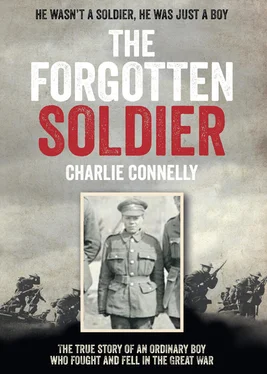It may have been Edward’s youth and deafness that kept him from the front earlier if, as I suspect, he didn’t see action until the spring of 1918. The medical examinations varied in their rigorousness at different points of the war. In the early days the doctors were paid a shilling for every man passed but received nothing for a man deemed unfit for service, so the temptation to err on the side of enlistment must have been great. Under conscription, however, the doctors were paid a flat rate and a three-tiered system of fitness was introduced. An A grade meant a man was fit for general service, B meant he was fit for service abroad but in a support capacity, while C designated a man fit for service at home only. Each category was then given a grade between one and three, one being the strongest. By the end of 1916 this system meant that only 6.5 per cent of new recruits were rejected as completely unfit for service, but as the war went on, and the need for more and more troops grew, a greater laxness crept into the system. When murmurs of public disquiet began about the apparent weakness of some of the troops being packed off to the Front, things were tightened up again in 1917.
If the accounts in this chapter are anything to go by, Edward would have been keen to sign up. For one thing, for a boy from a poor background with a pretty rotten job, the army would have been an appealing prospect in many ways. It was a career, a steady job, soldiers were well fed and the money wasn’t too bad: a private earned a shilling a day, with an additional penny for every day spent in a war zone (raised to 3d a day in 1918), a little better than George Fortune’s 3/6 a week for those long hours at the barber’s shop and Fred Dixon’s 5 shillings a week as a stationer’s runner.
At the same time, however, Edward would have had some idea of the horrors taking place on the fields of France and Flanders. His uncle had been killed. Many of his contemporaries from Admiral Place had gone to war; a few of them were never coming home. At this distance it’s impossible to know what Edward’s motivations or reservations would have been but, whether he was called up or volunteered, he entered the army at the age of eighteen, and I strongly suspect that he was first sent over to Flanders in the spring of 1918 once the law regarding nineteen-year-olds was relaxed. The 10th Queen’s had suffered heavy casualties in the German Spring Offensive and they needed to make up the numbers fast. One account of the 10th Queen’s mentions the arrival of ‘a load of nineteen-year-olds’ as new recruits around that time, and when the National Archives made the wills of soldiers available in 2012 I found Edward’s, made on 2 April 1918, three weeks short of his nineteenth birthday.
If the accounts above are anything to go by, there was no sense of fear among the young lads at enlistment. There was just a feeling that it was something you had to do, something that got you out of the routine of industrial life, something that promised adventure and something that made you feel that you were genuinely contributing to the war effort.
Enlisting was only the start, however. The next step was to turn these youngsters into soldiers. Meanwhile, I was trying to turn myself into a walker.
6
‘I am the King of England today, but heaven knows what I may be tomorrow’
I left what had been Gadsden Mews, re-emerged from the shadow of Trellick Tower into the glorious spring sunshine, made for central London, passed through Hyde Park and Victoria, walked through Westminster, over the river and onto the Thames Path. As I reached Bermondsey, the sky bruised and darkened, a chill wind blew up and the heavens opened. There wasn’t another soul on the Thames Path, and I walked for two and a half hours through Bermondsey, Rotherhithe and Deptford with the relentless pock, pock of raindrops on my waterproof and millions of pinpricks bursting on the grey-brown surface of the river. I was glad that I could stay at home that first night.
The next day my route through my native South-East London into Kent was arrow-straight and I was able to walk all the way out past the M25 without need for deviation until I reached Dartford, one of the first towns in the country to take in significant numbers of refugees fleeing the fighting on the Western Front. Within weeks of war being declared, bewildered Belgians began arriving in Dartford to be at first installed in the less-than-salubrious surroundings of the local workhouse before most were settled with obliging local families. Many found jobs in the town, including at the local Vickers munitions factory, where they made shells that could feasibly have ended up landing in their own back yard.
Such was the Belgian presence in Dartford that at one point a Belgian café opened, and the town began to take on a distinctly cosmopolitan air. The German prisoners of war in local hospitals before they were transferred to camps, as well as the arrival of Australian and American wounded, meant that the walls of the wards echoed with a range of accents and languages and, given the pain most of these men were in, rarely can so many swear words in so many languages and dialects have been heard in one place.
Further east I arrived one sunny spring afternoon in Gravesend, which was the scene of one of the war’s more curious incidents. Captain Robert Campbell of the 1st Battalion, East Surrey Regiment, had been a reservist before the war and was among the first to cross the Channel with the British Expeditionary Force in July 1914. A month later he was badly wounded near Mons – possibly he was one of the men left behind that troubled Walter Cook’s uncle Robert so much and led to Walter’s enlistment – captured and taken to a military hospital in Cologne, from where he was transferred to a prisoner-of-war camp in Magdeburg.
Two years into his internment, Campbell learned that his mother was gravely ill back home in Gravesend. Helpless and frustrated behind the wire of a prison camp far from home, and with nothing to lose, he wrote a letter to the Kaiser asking to be granted permission to see his mother one last time. Campbell must have been surprised to receive a reply at all, let alone one in which the German monarch granted him two weeks’ leave from the camp, relying on his honour as an officer to ensure his return within the time allowed.
Campbell made his way back to Kent by train and boat via the Netherlands, arriving home on 7 November to spend a week in Gravesend with his ailing parent. Captain Campbell was sure to depart again in good time to honour the terms of the Kaiser’s dispensation and returned to Germany to see out the remainder of the war in the Magdeburg camp. Mrs Campbell died eight weeks later.
Leaving Gravesend I rejoined Watling Street at Strood, walked along the western bank of the Medway, turned left over the bridge and crossed to Rochester, its castle high on a promontory before me as the ancient town woke up, stretched and prepared to embark on a warm spring Saturday. Skirting the centre, I turned along the riverside esplanade and followed the Medway south. On the outskirts of Rochester I was at last able to leave the sole-bruising hardness of tarmac and paving stone to join the waymarked North Downs Way, the national trail that would escort me the remaining fifty-odd miles to Dover and the English Channel. It was a steady climb onto the Downs, passing the churned chalky grey of recently ploughed fields, until in a break in the trees that lined the path I spied Kit’s Coty, a trio of ancient standing stones topped by a large, heavy capstone just off the path at the edge of a field.
This is purportedly the location of a great battle that took place in the middle of the fifth century, at which Vortigern and his forces took on the Jute army of Hengist and Horsa, whose assistance he had solicited for his own domestic power struggles only for the Jutes to decide they quite fancied sticking around and running the place themselves. The ‘Kit’ of the name is thought to come from Catigern, a son of Vortigern, who died on the battlefield that day and whose grave the ‘coty’ is purported to be. It is definitely an ancient grave of some kind: a barrow some seventy feet in length used to be visible until centuries of ploughing levelled the ground, leaving this clutch of ancient stones encased by railings at the edge of the field as the only apparent remnant of a battle that no one is actually certain even took place. Its mysterious provenance has made the Coty an attraction for visitors for centuries: George Orwell passed by in the 1930s, while Samuel Pepys pronounced it ‘a thing of great antiquity and I am mightily glad to see it’.
Читать дальше












